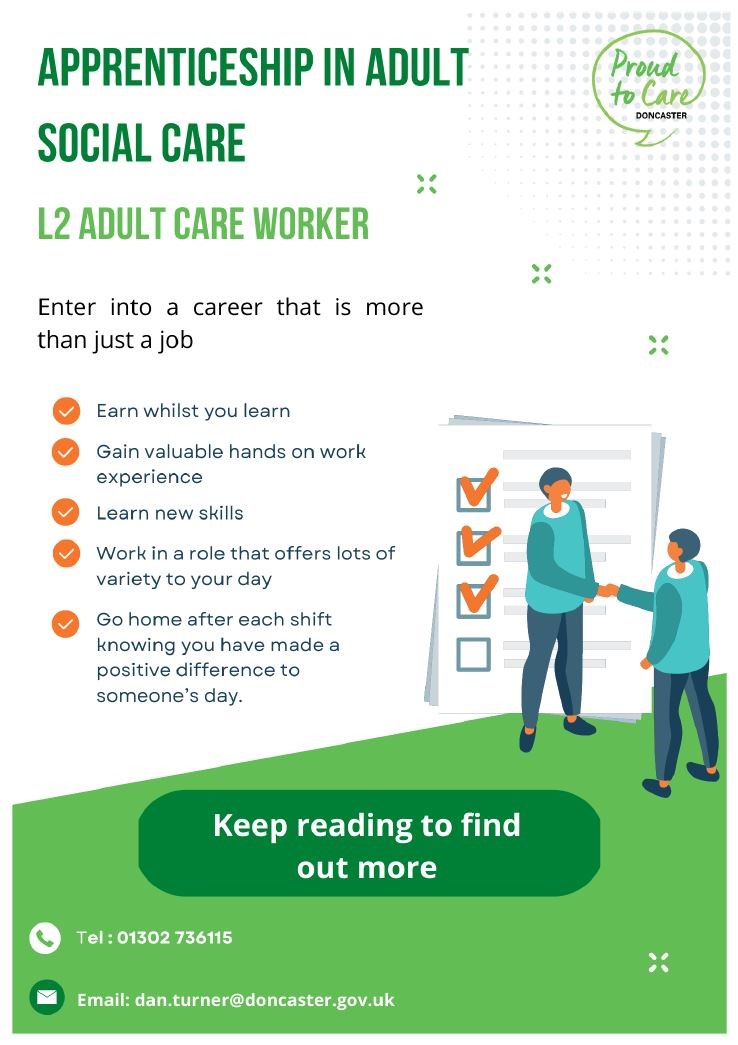Proud to Care Job Roles and Current Vacancies
Find out about some of the different roles within Adult Social Care and a list of current vacancies.
Care Assistant
The role of a Care Assistant/Domiciliary Carers are paramount in the day-to-day lives of all the people they care for and are the foundation of the Social Care Sector.
To learn more about the role of a Care Assistant download the brochure below:
- Care Assistant E Brochure
- Download (2.72MB - PDF)
Personal Assistant
A Personal Assistant will work directly with one or more individuals to help them with various aspects of their daily life, to help them live as independently as possible.
To learn more about the role of a Personal Assistant download the brochure below:
- Personal Assistant E Brochure
- Download (2.71MB - PDF)
Support Worker
The role of a Support worker are paramount in the day-to-day lives of all the people they support, and are the foundation of the Social Care Sector.
To learn more about the role of a Support Worker download the brochure below:
- Support Worker E Brochure
- Download (2.72MB - PDF)
Social Worker
Social workers aim to improve people’s lives by helping with social and interpersonal difficulties, promoting human rights and well being. Social workers protect children and adults with support needs from harm. This can be anything from helping, keep a family under pressure together, to supporting someone with mental health problems, social work is a varied, demanding, often emotional and very rewarding career.
To learn more about the role of a Social Worker and how to become a Social Worker download the brochure below:
- Social Worker E Brochure
- Download (2.7MB - PDF)
Occupational Therapist
Occupational Therapist’s take a ‘whole person’ approach to each person’s physical and mental well being by considering all their needs – physical, social, psychological and environmental. They assess, plan, implement and evaluate treatment plans in both hospital and community settings. They establish realistic goals with the person with meaningful outcomes.
To learn more about the role of a Occupational Therapist and how to become a Occupational Therapist download the brochure below:
- Occupational therapist E Brochure
- Download (2.69MB - PDF)
Apprenticeships
An apprenticeship is a real job where you can learn, gain experience and are paid. You are an employee with a contract of employment and by the end of an apprenticeship you will have the right skills and knowledge needed for your chosen career.
As an apprentice, you will:
- Work alongside experienced staff
- Gain job-specific skills
- Get time for study related to your role
- Be paid a salary
- Have a contract of employment
- Learn from industry experts
- Conduct 20% of your paid time undertaking off-the-job learning
- Get free training
- All apprenticeships last for a minimum of 12 months. Most apprenticeships take between 1 - 4 years to complete, however it will depend on the level and delivery model of the apprenticeship.
Who can become an Apprentice?
You can apply for an apprenticeship if you’re:
- Over 16 years of age
- Living in England
- Not in full-time education
You can apply for an apprenticeship while you’re still at school as long as you’re 16 by the end of the summer holidays.
To learn even more about Apprenticeships download the brochure below:
- Apprenticeship E Brochure
- Download (3.84MB - PDF)
Support for Doncaster Care Providers
If you are an adult social care employer thinking about utilising apprenticeships, please read the following flyer for more information and to find out what support Proud to Care can offer:
- Support for Doncaster Care providers utilising apprenticeships
- Download (526KB - PDF)
Please download the following flyer if you would like to learn more about starting a career in care through the apprenticeship route:
- L2 Adult Care Worker Apprenticeship
- Download (1.85MB - PDF)
Other Careers in Social Care
Community Support and Outreach Work: These roles are based on support, rather than providing direct personal care. They help people overcome difficulties, live independently and cope with many aspects of everyday living.
Management: Management jobs can range from Supervisor to the Chief Executive of a care home, but all are responsible for the wellbeing of staff, who provide care and support
Activities Worker/Co-ordinator: As an Activity Coordinator your role will be to create and oversee activities for people needing care and support. This could be in a residential care home, a community care setting or an individual’s home.
Technician/Assistive Technology: This job role involves maintaining and providing advice on the use of electronic and electro-mechanical equipment designed for people using care and support services to help them live their lives as independently as possible.
Rehabilitation Worker: The role of Rehabilitation Worker involves supporting individuals to live as independently as possible, often following an illness or accident.
Administration and other Office Roles such as Receptionist, Information Technology, Personnel, Human Resources, Finance and Marketing: These are not direct care roles, but larger care providers will have these roles available within an office environment and are essential to the running of a care organisation. You will carry out administration tasks to support the organisation in your area of specialism.
Cook or Kitchen Assistant: You will prepare, cook and serve meals to people usually in a nursing or residential home, or in a day care centre.
Housekeeper, Cleaner, Domestic Worker: You will ensure that the environment in a residential home or sheltered housing is safe, tidy and clean.
Maintenance Worker, Handy Person: You will carry out practical maintenance jobs, usually in a residential home or sheltered housing.
Commissioner: As a commissioner, you will arrange services for people who need care and support. You could commission NHS funded services such as therapy or work with a particular client group such as older people or people with a mental health condition. You could work for a local authority, a Clinical Commissioning Group or another NHS Service. There are a range of roles within commissioning teams include quality assurance and compliance.
Training or Assessor: You will be involved in designing and delivering learning and development sessions to improve the knowledge and skills of staff.
Registered Nurse: You will be a fully trained nurse who works in a nursing home or the community to provide a range of clinical tasks including dressing wounds, taking blood samples and recording medical information.
Have you seen something of interest?
If so, why not view our current vacancies you can apply right now by clicking on the Apply Now button below or get in touch via the enquiry form below and one of our team will get back to you soon.
<< Back to Proud to Care main page
Downloads & Resources
Display your introduction over featured image?: No








